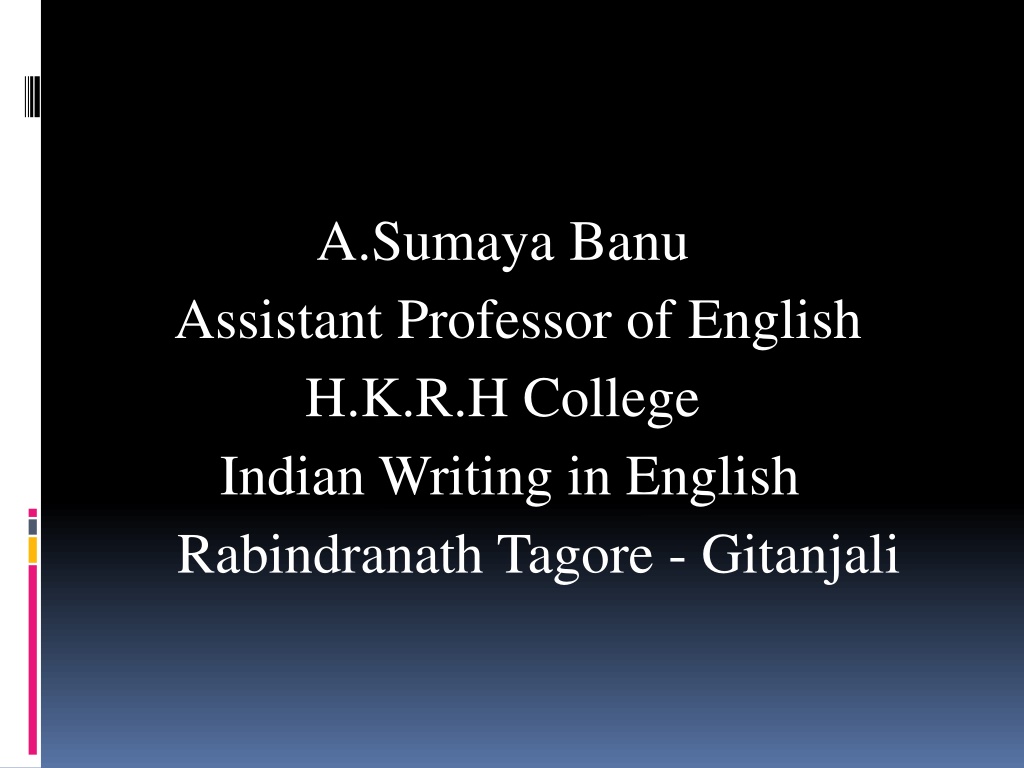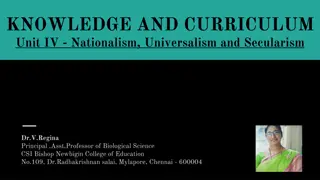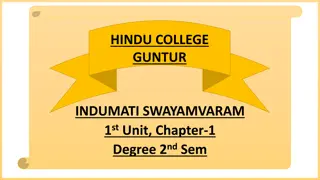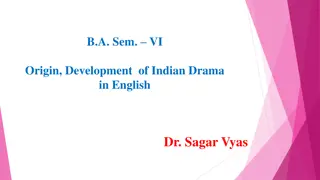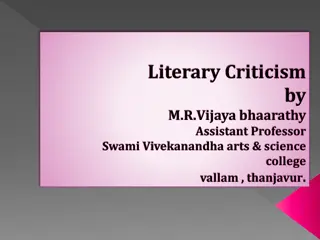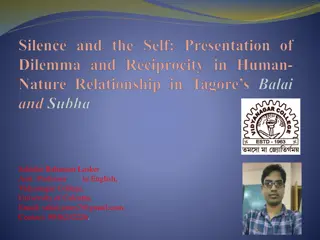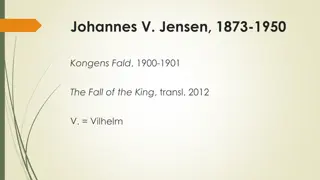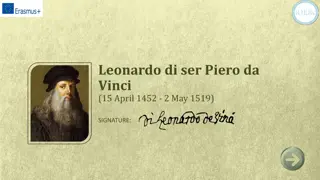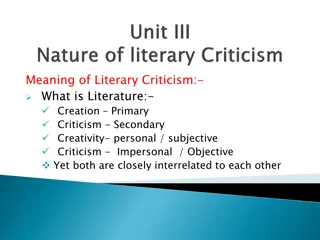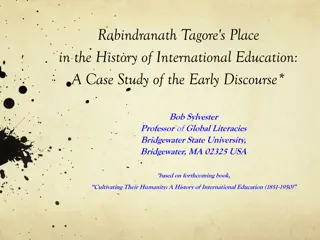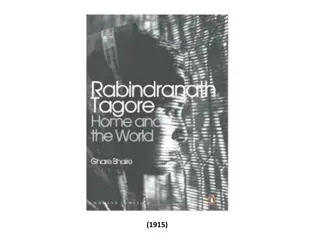Life and Works of Rabindranath Tagore: A Literary Genius
Rabindranath Tagore, a prominent Bengali poet, short-story writer, and painter, revolutionized Bengali literature by introducing new prose and verse forms. He was the first non-European to win the Nobel Prize in Literature in 1913. Tagore's deep connection with the Bengali countryside and his profound impact on Indian culture make him a towering figure in early 20th-century India.
Download Presentation

Please find below an Image/Link to download the presentation.
The content on the website is provided AS IS for your information and personal use only. It may not be sold, licensed, or shared on other websites without obtaining consent from the author.If you encounter any issues during the download, it is possible that the publisher has removed the file from their server.
You are allowed to download the files provided on this website for personal or commercial use, subject to the condition that they are used lawfully. All files are the property of their respective owners.
The content on the website is provided AS IS for your information and personal use only. It may not be sold, licensed, or shared on other websites without obtaining consent from the author.
E N D
Presentation Transcript
A.Sumaya Banu Assistant Professor of English H.K.R.H College Indian Writing in English Rabindranath Tagore - Gitanjali
AUTHOR S INTRODUCTION Rabindranath Tagore, Bengali Rab ndran th h kur, (born May 7, 1861, Calcutta [now Kolkata], India diedAugust 7, 1941, Calcutta), Bengali poet, short-story writer, song composer, playwright, essayist, and painter who introduced new prose and verse forms and the use of colloquial language into Bengali literature, thereby freeing it from traditional models based on classical Sanskrit. He was highly influential in introducing Indian culture to the West and vice versa, and he is generally regarded as the outstanding creative artist of early 20th-century India. In 1913 he became the first non-European to receive the Nobel Prize for Literature.
The reformer Debendranath Tagore, he early began to write verses, and, after incomplete studies in England in the late 1870s, he returned to India. There he published several books of poetry in the 1880s and completed Manasi (1890), a collection that marks the maturing of his genius. It contains some of his best-known poems, including many in to Bengali, as well as some social and political satire that was critical of his fellow Bengalis. son of the religious verse forms new
In 1891 Tagore went to East Bengal (now in Bangladesh) to manage his family s estates at Shilaidah and Shazadpur for 10 years. There he often stayed in a houseboat on the Padma River (the main channel of the Ganges River), in close contact with village folk, and his sympathy for them became the keynote of much of his later writing. Most of his finest short stories, which examine humble lives and their small miseries,
Tagore came to love the Bengali countryside, most of all the Padma River, an often-repeated image in his verse. During these years he published several poetry collections, notably Sonar Tari (1894; The Golden Boat), and plays, notably Chitrangada (1892; Chitra). Tagore s poems are virtually untranslatable, as are his more than 2,000 songs, which achieved considerable popularity among all classes of Bengali society.
This book, containing Tagores English prose translations of religious poems from several of his Bengali verse collections, including Gitanjali (1910), was hailed by W.B. Yeats andAndr Gide and won him the Nobel Prize in 1913. Tagore was awarded a knighthood in 1915, but he repudiated it in 1919 as a protest against the Amritsar (Jallianwalla Bagh) Massacre.
From 1912 Tagore spent long periods out of India, lecturing and reading from his work in Europe, the Americas, and East Asia and becoming an eloquent spokesperson for the cause of Indian independence. Tagore s novels in Bengali are less well known than his poems and short stories; they include Gora (1910) and Ghare-Baire (1916), translated into English as Gora and The Home and the World, respectively. In the late 1920s, when he was in his 60s, Tagore took up painting and produced works that won him a place among India s foremost contemporary artists.
Introduction of Poem Originally written in Bengali language. English Gitanjali or Song Offering is a collection of 103 English poems of Tagore s own English translations. git+anjali, Git means song, and anjali means offering.its mean Song offerings . The publication of the English version of Gitanjali paved Tagore a way to the world of English lit. Published in 1912 Nobel prize in 1913 Swedish academy
GITANJALI - I Making me inexhaustible Gives you pleasure; Exhausting me fully,
You fill me till I am born a new Taking the little flute that I am, You cross hills and river banks, Evoking endless tunes from me! Who could I tell all this to?
In your everlasting caress My heart loses sight of limits And in immense bursts of joy Song lyrics rise in me.
You give me what I can take With my hands,night and day, Years pass but there is no end To what I receive from you!
GITANJALI-II When you ask me to sing My heart swells with pride As I look intently at you My eyes moisten with tears All that is hard and bitter in me Melts into heavenly music All my prayers and thoughts Take wings like merry birds
You are content with my songs I know they please you They admit me to your company The One I can t reach through thought Accepts me through my songs! My songs make me forget myself And let me call my Lord my friend.
GITANJALI-III O wise one,how do you sing so well? I listen in amazement,completely enthralled! Your melodies light up the world And waft across heavens, Melting stones, driving everything in the way, Carrying along with them heavenly music.
Through the tunes keep eluding my voice I feel like singing in that superb vein What I would like to say get stuck And my soul cries out, defeated! What trap have you ensared me into? Your music has me fully in its thrall!
